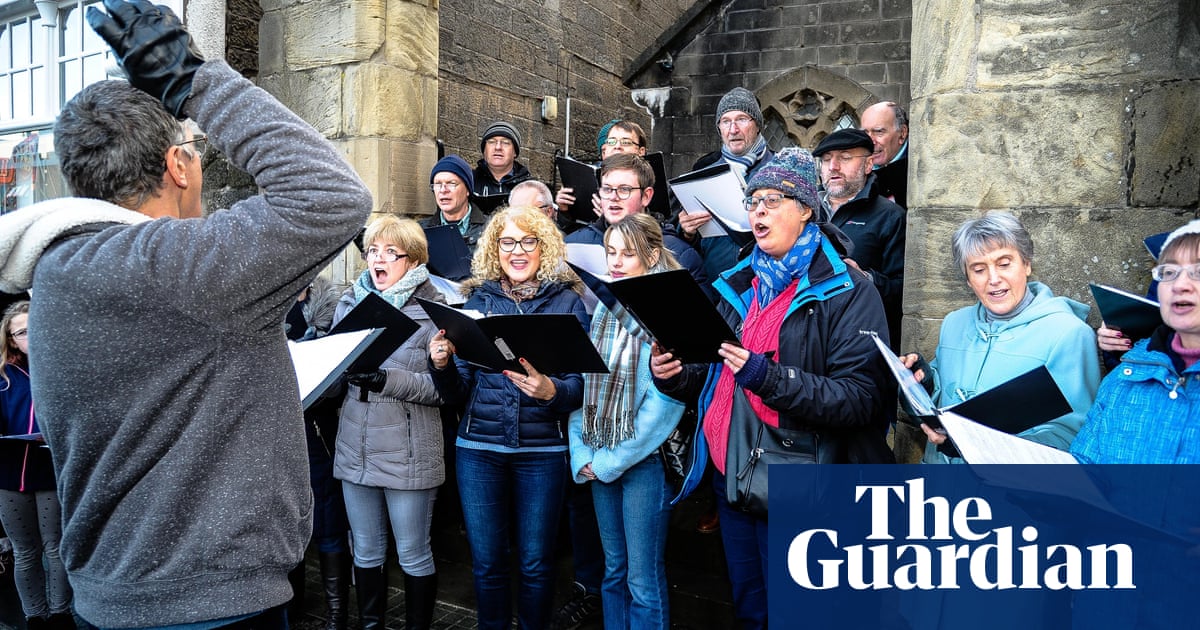
For the Columbia Road carol service in Bethnal Green, east London, the power of TikTok proved too much. After footage of December’s first singalong went viral, thousands turned up to ding dong merrily, forcing organisers to scrap the events over fears for public safety.
The cobbled street’s Victorian charm has always drawn the crowds, but the carol service has become an extraordinary seasonal hit. The success mirrors the nation’s newfound enthusiasm for group singing, a trend that follows the rise of the TV choirmaster Gareth Malone and the increasing popularity of rock choir and pop choir.
What draws people to singing, and the benefits it brings, have been the subject of research for centuries. But only in the past few decades has the evidence come together on how and why singing improves health and wellbeing. “This is a really burgeoning topic,” said Daisy Fancourt, a professor of psychobiology and epidemiology at University College London. “And in recent years, there’s been a real elucidation of the mechanisms.”
Singing has brought humans together, and driven social bonding, since the early history of the species. Over the course of human evolution, the activation of endorphins, which creates a sense of contentment and peace with the world, emerged as a primary means to bond large communities. It turns out that singing is an incredibly potent trigger.
“Singing is one of the mega-mechanisms we use for bonding,” said Robin Dunbar, a professor of evolutionary psychology at the University of Oxford. “Singing in the shower gives you a bit of an uplift, but when doing it communally, there’s something about the synchrony of singing that creates this massive endorphin uplift.”
In a 2015 study, Dunbar and his colleagues found that strangers who sang together for an hour emerged from the sessions with an unusually close bond. “It was as if they’d known each other since primary school,” he said. “And that doesn’t normally happen if you spend an hour in the company of strangers.” Singing, the researchers concluded, was the ultimate ice-breaker.
But what makes singing so effective? Dunbar believes the prolonged exhalation involved in singing stresses the lungs and chest wall, activating the release of endorphins. The effect is amplified in choirs, and at events such as carol concerts, by the sense of vocal synchrony. “The effect is highly scalable,” said Dunbar. “The bigger the group, the better it works, and that doesn’t happen with any other bonding process we use.”
Evolution has also lent a hand to ensure singing works its magic in mixed groups. It so happens that male and female voices are, on average, one full octave apart, meaning males and females can sing in synchrony, despite having different pitches.
The mental health benefits of singing are beyond doubt. Fancourt, who studies the health benefits of singing and other arts, said singing supported emotional regulation, equipping us to deal better with life’s challenges. It takes our mind off problems, gives us an outlet to vent our frustrations, and helps us build a sense of self. “That sense of identity supports you in your day-to-day life,” Fancourt said. “When things are going badly at work, you rely on other parts of life to support you. If things are going well in other domains, it supports how you cope.”
The combination of all the positives has a substantial impact on wellbeing. People who are more engaged in singing have lower rates of depression and higher levels of wellbeing and life satisfaction than others.
Singing therapies look promising too, at least for certain conditions. While patients with dementia can lose life memories, they often remember the music of their youth, meaning singing can become a means of connection, a crucial bridge to a lost relative. Group singing sessions have also been shown to improve movement in Parkinson’s disease. Singing may boost cognitive skills too, but the evidence of that is mixed and more research is needed.
There are physical benefits too, research suggests. Studies have found singing reduces blood pressure, heart rate and stress hormones, and early work is promising on lung health and breathlessness brought on by conditions such as chronic obstructive pulmonary disease (COPD) and long Covid.
With the Columbia Road carols on hold for now, the thousands keen to attend the services will have to get their fix another way. “It was so obvious that we had to pull it,” Heather Atkinson, the vicar at St Peter’s Bethnal Green, told the BBC. “So let’s see if we can find a way of resurrecting it in a safer form.”












